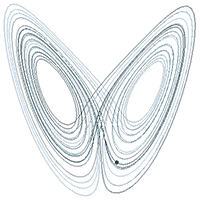The term “chaos” is derived from the ancient Greek word meaning “void” or “emptiness.”
In the context of chaos theory, chaos refers to a state of disorder and unpredictability, where small changes in initial conditions can lead to vastly different outcomes. Chaos theory challenges our traditional notions of order and predictability in the natural world, revealing the underlying complexity and interconnectedness of systems that may appear random at first glance.
Chaos theory, as it is known today, first emerged in the late 20th century thanks to the pioneering work of mathematicians like Edward Lorenz.

In the early 1960s, Lorenz was studying weather patterns and using a set of differential equations to model them.
However, he discovered that even small changes in the initial conditions of the system could lead to vastly different outcomes. This sensitivity to initial conditions became known as the “butterfly effect,” where a butterfly flapping its wings in Brazil could set off a tornado in Texas.
This discovery revolutionized the field of mathematics and led to the development of chaos theory, which studies the behavior of dynamic systems that are highly sensitive to initial conditions. These systems exhibit complex and unpredictable behavior that appears random but is actually governed by underlying mathematical principles.
Today, chaos theory is a vibrant and active field of research that spans multiple disciplines, including mathematics, physics, biology, economics and even spiritually.
Scientists are continually exploring the applications of chaos theory in various real-world phenomena, from predicting the behavior of the stock market to understanding the dynamics of the human heart.
One of the most recent advancements in chaos theory is the study of chaotic systems in network theory. Researchers are examining how complex networks, such as social media platforms or neural networks in the brain, exhibit chaotic behavior and how this can be harnessed for various applications.
From its humble beginnings in the study of weather patterns to its current applications in various disciplines, chaos theory offers a unique perspective on the complex and interconnected nature of the universe.
Next time you hear the term “chaos,” remember that it’s not just about disorder and randomness but also about the order and beauty that lie beneath the surface.